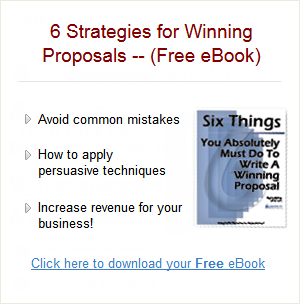When you are in business, a good way to generate business is to win a government contract. There is almost an endless amount of government contracts available, so no matter what your business you should be able to find one that you can do and bid on. Now, getting a government contract is not as
The best way to find out what your customers hot buttons are is to ask him. You don’t exactly put it that way; you can say, “What are your biggest concerns about this project?” Or, “What are you most worried about that might go wrong?” I’m always surprised at how reluctant people are to ask
Here’s a test it consists of two questions: Question #1: How long would it take your firm to approve a $30,000 purchase of new monitors for your sales and marketing administrative staff? A day? A month? More than one month? And how much analysis would have to be done? Question #2: How long does it
What would an evaluator say when she first reads your proposal? If she is looking for reasons to disqualify you, will she find them? Does your proposal contain ammunition for those on the Evaluation Committee who don’t want you to win? What would an evaluator say when she first reads your proposal? If she is
I’ve said time and again in these pages how important it is to give the client what he wants. But to do that, you have to know what that is. And how do you find out what your clients want? Well, you talk to them, and you listen. This is such a simple, fundamental task,
I recently posted an article on the four different “types” of readers in any give proposal evaluation scenario. Last time out, I talked about the “Economic” buyer. This time I’ll focus on a second category—the “User” buyer. User buyers are the ones who will ultimately use whatever it is you offer. If they have a
Most proposals are evaluated by more than one person. Even in the case of letter proposals you write for a customer who has asked you informally for a quick scope of work, a timeline and a cost estimate, the final decision to hire your firm will likely be left to someone at a higher level
Economic buyers are the “money” people in the client’s organization. They control the budget and have veto power over any decision requiring spending. They will take a hard look at the return on their investment and they want to make sure they get the best deal for the organization. Who they are and what they
When the customer buys your product, he is buying a thing. When he is buying your services, he is buying your time. There is a fundamental difference between selling a thing and selling your time. That goes for the proposals you have to write as well. When you sell a product, the customer can “test
How do you budget for your proposals? You do draw up a budget for your proposals, don’t you? If you don’t, you’re not alone. Many firms neither budget for nor keep track of costs for proposal development. They simply write the costs off as “overhead.” Bad plan. If you don’t know how much you are

